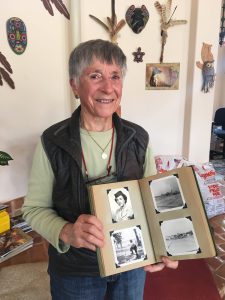More than six decades after the U.S Air Force discharged her without warning, Helen James is still seeking the honors she earned.
Helen entered the military in 1952 as a radio operator on a base in Roslyn, N.Y., following in the footsteps of her father, who had served in the Army. No one talked in those days about being a lesbian, Helen recalls, but she was grateful to have found a “community.”
 “We were there to do our jobs,” she says, “And all of us were doing our jobs and doing them well.” When they had time, she and a few friends would take the train into Manhattan, where they went to gay bars a few times. And she enjoyed traveling to other bases for games as a member of the women’s basketball club.
“We were there to do our jobs,” she says, “And all of us were doing our jobs and doing them well.” When they had time, she and a few friends would take the train into Manhattan, where they went to gay bars a few times. And she enjoyed traveling to other bases for games as a member of the women’s basketball club.
Everything changed when Helen and three friends were picked up on their way back from the city one night and interrogated as part of what she now sees as a much larger effort to purge the military of lesbians and gay men. She received a “Dishonorable Discharge” and found herself suddenly unemployed, unable to return to the teaching career she’d started before joining the Air Force, and ineligible for veterans’ benefits. It took her more than 60 years to shake the shame and anxiety.
“Honestly, I didn’t know I could do something about this, that I could have a lawyer to help me at this point,” she recently told Legal Aid at Work attorney Elizabeth Kristen. “[Your help] has just been amazing…. You have been right there for me.”
At 90, Helen still sees patients in her physical therapy practice near Fresno, California — she ended up getting a graduate degree at the University of Pennsylvania. And she actively tends her ranch, where she recently gave us a tour, pointing out a circle of trees that she and her late partner planted nearly 20 years ago; they now tower above her 5-foot frame. She showed off the ax she still uses to chop firewood and the tractor she rides to survey her property. Then she brought us into her living room, history and eclectic art pieces all around.
We admired a small framed photo of Helen’s father in uniform during World War I and a large portrait hanging in her living room of her whole family on their farm in rural Pennsylvania, where she grew up in the 1930s.
Always ambitious, and an enthusiastic high school athlete, Helen had high hopes when she enlisted in the Air Force and joined the basketball league, and she quickly rose to the rank of second lieutenant. So her arrest that night in 1955 remains a difficult memory redolent of McCarthyism, then at its peak.
“They interrogated me, asked me twisted questions about what kinds of  relationships I had with my mother and sister,” she recalls. “I got sick to my stomach.” After her interrogators threatened to tell her family and friends at home that she was lesbian, she eventually signed a severance form, not understanding the full consequences until later.
relationships I had with my mother and sister,” she recalls. “I got sick to my stomach.” After her interrogators threatened to tell her family and friends at home that she was lesbian, she eventually signed a severance form, not understanding the full consequences until later.
Helen is among thousands of lesbian and gay veterans whose papers were not automatically corrected when “Don’t Ask Don’t Tell” was retracted in 2011. Elizabeth Kristen (at left above) has been working to resolve Helen’s status since a veterans advocate put Helen in touch with Legal Aid at Work in 2016.
Helen gained access to some veterans’ benefits, including healthcare, in the 1960s, after winning a discharge upgrade to “General Under Honorable Conditions,” a counterintuitive phrase that actually meant she was not worthy of an “Honorable Discharge.”
 Now, though, her thoughts are shifting toward her legacy, and it is deeply important to her to know an honor guard will attend her funeral, ceremonially fold a U.S. flag, and present it to her survivors. But that is reserved for veterans with an Honorable Discharge.
Now, though, her thoughts are shifting toward her legacy, and it is deeply important to her to know an honor guard will attend her funeral, ceremonially fold a U.S. flag, and present it to her survivors. But that is reserved for veterans with an Honorable Discharge.
Being recognized properly for her service would, Helen says, give her peace of mind and help her heal. The support she already has received from Legal Aid at Work has helped: “Veteran is a word I can associate with now.”
We will continue working with Helen until we secure the legacy and honor she deserves.